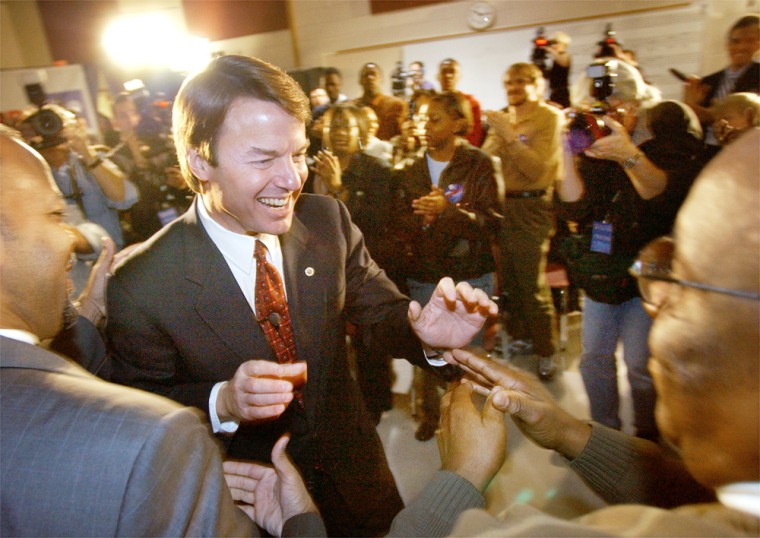Democratic presidential candidate John Edwards is trying to take advantage of two unexpected political developments: Howard Dean’s misfortunes and a surge in campaign contributions triggered by his own strong showing in Iowa.
It’s enabled the North Carolina senator to look beyond his Southern base and pay for advertising in some states with delegate contests after Feb. 3, allowing him to compete more effectively against front-runner John Kerry, Edwards’ strategists said.
While Dean is facing a serious financial crunch, Edwards’ campaign said Thursday it had taken in $1 million in new contributions since Edwards’ surprise second-place finish in Iowa’s Jan. 19 caucuses.
Of that, $700,000 was raised over the Internet.
“The boomlet has let us build resources for states beyond February 3,” said Edwards campaign spokeswoman Jennifer Palmieri.
As a result, Edwards has been running TV ads in Virginia and Tennessee, which hold primaries Feb. 10, in addition to four Feb. 3 states: his native South Carolina, New Mexico, Oklahoma and Missouri.
The campaign is not advertising in the remaining three Feb. 3 states: Arizona, North Dakota or Delaware.
On Thursday, Edwards and his supporters seized on Dean’s decision not to air campaign commercials in any of the Feb. 3 states, as well as Kerry’s suggestion that a Democrat could win the White House without Southern states.
“We’ve never elected a president of the United States without winning at least five Southern states,” Edwards told reporters Thursday as he prepared for a candidates’ debate.
In remarks aimed at Kerry, Edwards called it “a very risky choice.”
Kerry, also in South Carolina, said he had simply been observing the reality of electoral math and not signaling a strategy to write off the South.
Edwards also expressed surprise at Dean’s decision Wednesday, in the heat of the primary season, to replace campaign manager Joe Trippi with former Al Gore aide Roy Neel.
'Dance with the one you come with'
“You dance with the one you come with,” he said in a brief interview.
Edwards said he didn’t expect just a few weeks ago that Kerry — and not Dean — would be the man to beat. “We both started to rise about the same time,” he said of his and Kerry’s surge in Iowa.
While Edwards has said he must win South Carolina, Dean’s money problems coupled with Edwards’ fund-raising surge should combine to make Edwards more competitive in Feb. 3 states other than South Carolina, Palmieri suggested.
“February 3 was always the most important for us,” she said. But she said the campaign never expected Dean’s fade. “We thought we would be outspent significantly.”
Edwards’ advisers also weren’t underestimating Kerry’s strength, even in South Carolina.
Shooting for a two-man field
Their hope was that the Feb. 3 races would help Edwards to prevail over both Kerry and retired Gen. Wesley Clark in South Carolina and in several other battleground states, and winnow the field to a two-man race between Kerry and Edwards.
Edwards told reporters he must win South Carolina, but also believes he has a good shot at winning Oklahoma, New Mexico and even Missouri.
Edwards returned to South Carolina on Thursday after several campaign stops in Missouri, including a morning fund-raiser in St. Louis.
He suffered a setback here when Rep. Jim Clyburn, the state’s most prominent black politician, formally endorsed Kerry. The endorsement was important because as many as half of the voters in Tuesday’s primary could be black.
Before Thursday’s presidential debate, Edwards made his case to blacks at a candidates’ forum sponsored by a local AME church.
One audience member, Quincy Jones, 64, of Greenville, listened carefully to Edwards’ vow to aggressively fight the last vestiges of discrimination. But later, he said, “I’ll probably vote for Kerry.”
“Edwards can’t beat Bush,” he said. Then he added, “Kerry probably can’t either. Nobody can.”
